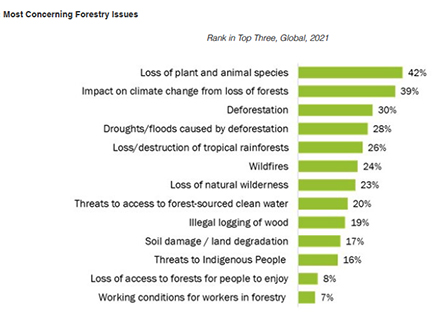New research has confirmed that consumers want to make sustainability-focused purchasing decisions and trusted third party certification labels play an increasingly important role. Source: Timberbiz
According to research conducted by Globe Scan for the Forest Stewardship Council (FSC) with 12,000 participants across 15 countries, consumers list climate change as their second most important global worry.
When compared against the previous 2017 study, this concern is significantly up. Understandably, disease/health issues ranked first in the research, although the comparable level of concern about climate change sends a stark message in terms of urgency to act.
For forests specifically, the research found increasing concerns about the loss of plant and animal species and the impact of deforestation on climate change.
Consumers’ sustainability concerns also appear to increasingly influence their shopping choices, with more than 80% of shoppers saying they expect companies to ensure their wood and paper products do not contribute to deforestation.
Additionally, the survey found that 86% of consumers try to avoid products that damage biodiversity and about seven in 10 want to choose products that do not contribute to climate change. As such, consumers pay attention to these factors when choosing wood-based products and packaging and expect companies to ensure their products do not harm the environment.
When asked about influences on their purchases of wooden products, protecting animals and plants and sourcing from sustainably managed forests were among consumers’ biggest these motivators were even higher than product quality.
Consumers’ belief in their own potential impact is also growing. Independent certification also influences product choice among shoppers, with nearly eight in 10 consumers believing sustainability product information should be certified by an independent organization.
These results show that the need for trusted eco-labels has never been greater. There is a steep upward trend in people’s interest in companies’ social and environmental impact; therefore, the opportunity for ecolabels is growing, highlighting the value that brands can gain from partnering with trusted certification systems.
“Consumer insights are crucial to help FSC focus on the priorities” says Jeremy Harrison, Chief Markets Officer at FSC.
These findings inspire confidence that consumers appreciate the vital role forests play in tackling major sustainable development challenges and that consumers recognize and trust FSC as part of the solution.
The FSC label is a powerful tool to help consumers make more sustainable shopping choices. Consumers purchasing FSC-certified products trust that FSC is effective in protecting forests with seven in 10 shoppers feeling motivated to buy a product when they see the FSC label.
In turn, brands and retailers support sustainable shopping choices by sourcing responsibly sourced timber and wooden products from FSC-certified forests.
The research shows that FSC’s visibility and trust is rising globally, reflecting a strong trend towards conscious consumerism. Fifty-four percent of consumers express high levels of trust in FSC’s role to protect forests above all other actors – including governments and companies. Boosted by a positive context for ecolabels, the role of businesses and brands to inspire consumers about the value of sustainable forest management has never been more important.








